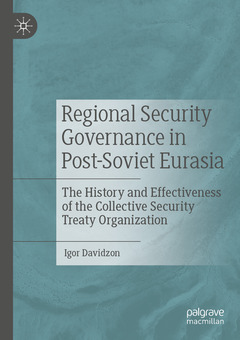Description
Regional Security Governance in Post-Soviet Eurasia, 1st ed. 2022
The History and Effectiveness of the Collective Security Treaty Organization
Author: Davidzon Igor
Language: English
Subject for Regional Security Governance in Post-Soviet Eurasia:
Keywords
Eurasian regionalism; post-soviet politics; Collective Security Treaty Organization (CSTO); NATO; non-western military alliances; Eurasian regional security governance; post-Soviet security governance; military alliance; military cooperation; Russian influence; collective security; Russia; Belarus; Armenia; Kazakhstan; Tajikistan; Kyrgyzstan
Publication date: 10-2022
204 p. · 14.8x21 cm · Paperback
Publication date: 10-2021
204 p. · 14.8x21 cm · Hardback
Description
/li>Contents
/li>Biography
/li>Comment
/li>
This book explores post-Soviet Eurasian regional security governance, as embedded in the military alliance of Collective Security Treaty Organization (CSTO). CSTO was established in 2002 and consists of six post-Soviet countries: Russia, Belarus, Armenia, Tajikistan, Kazakhstan and Kyrgyzstan. Moving studies of regional security governance beyond the so-called Eurocentrism trend expressed, inter alia, via the focus on Western military alliance, such as NATO, this book examines CSTO as a new, post-Soviet form of regional security cooperation by looking at the reasons and drivers behind the establishment of the post-Soviet Eurasian security governance; the organization's institutional design; the military capabilities of its member states; the degree of the members' integration within the alliance; the cooperation pattern adopted by CSTO members; as well as the effect and effectiveness of this military alliance.
First book to explore the emergence and relevance of the Collective Security Treaty Organization (CSTO)
Contextualises CSTO within Eurasia and other regional security organizations
Explores the reliability of CSTO as Russia’s power tool in the new, post-Cold War wave of Russia-West confrontation




